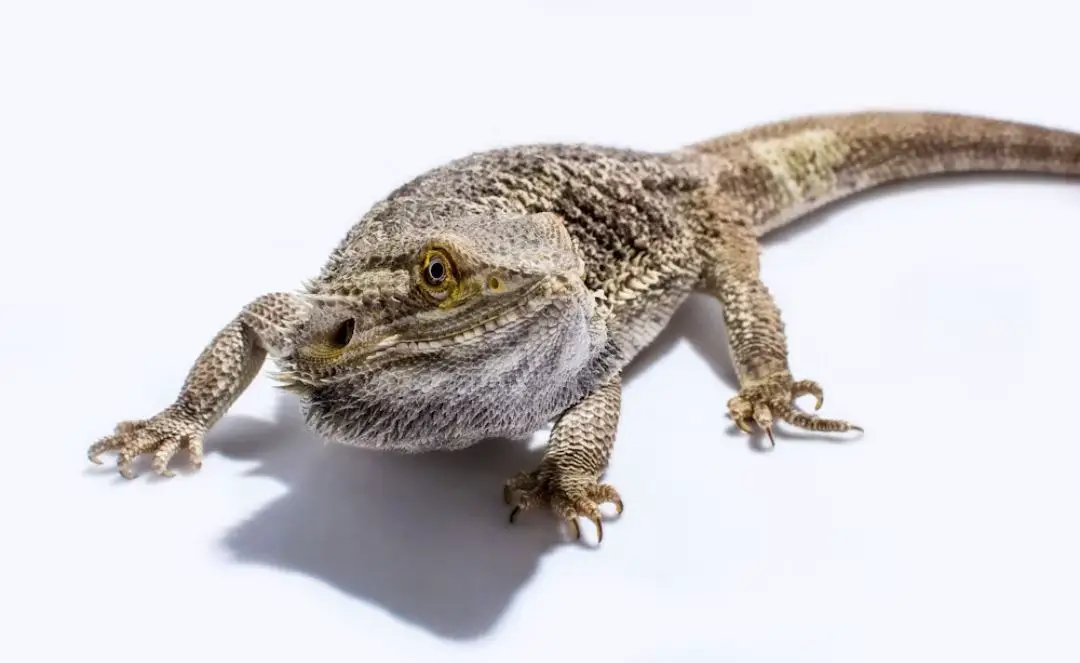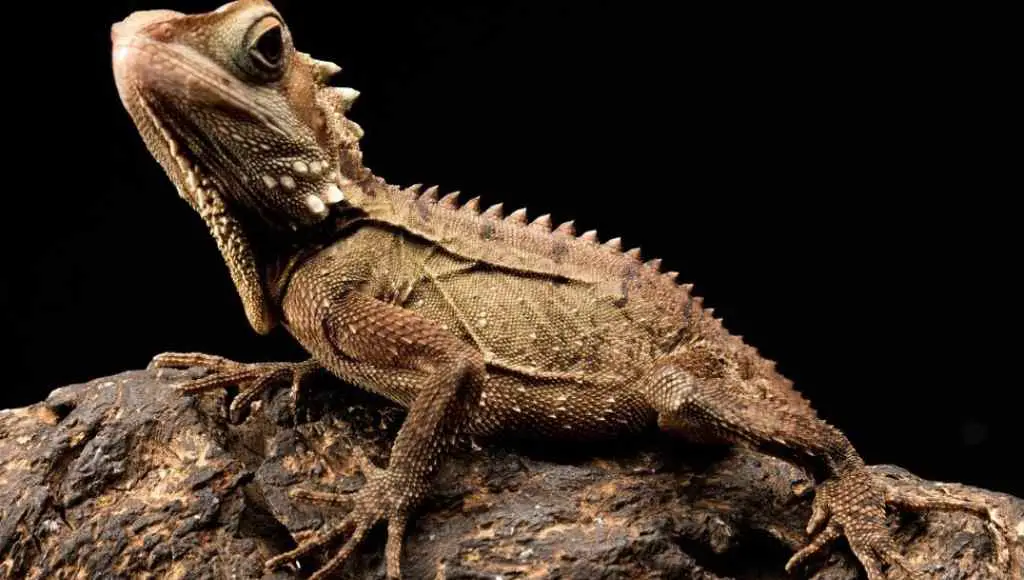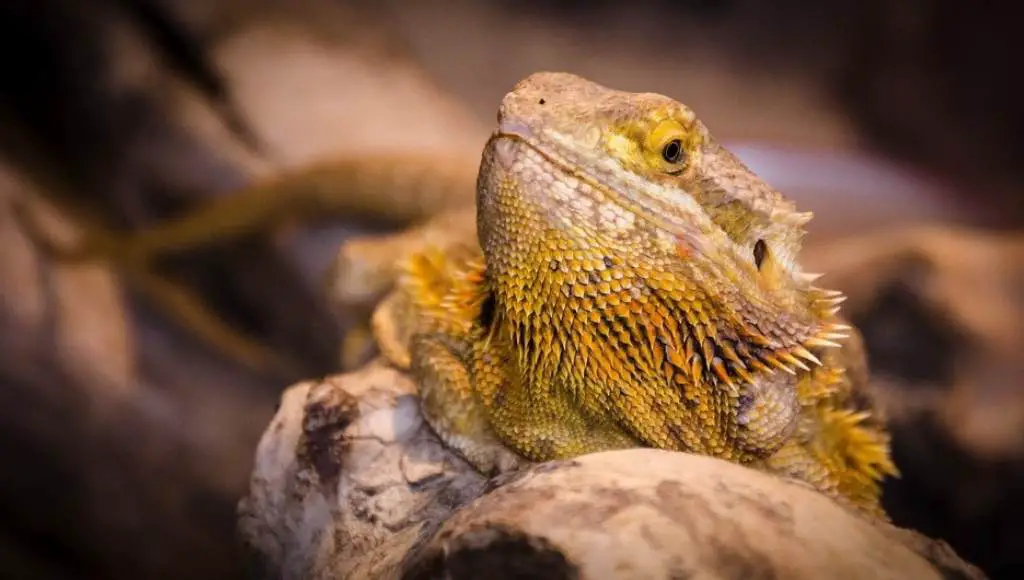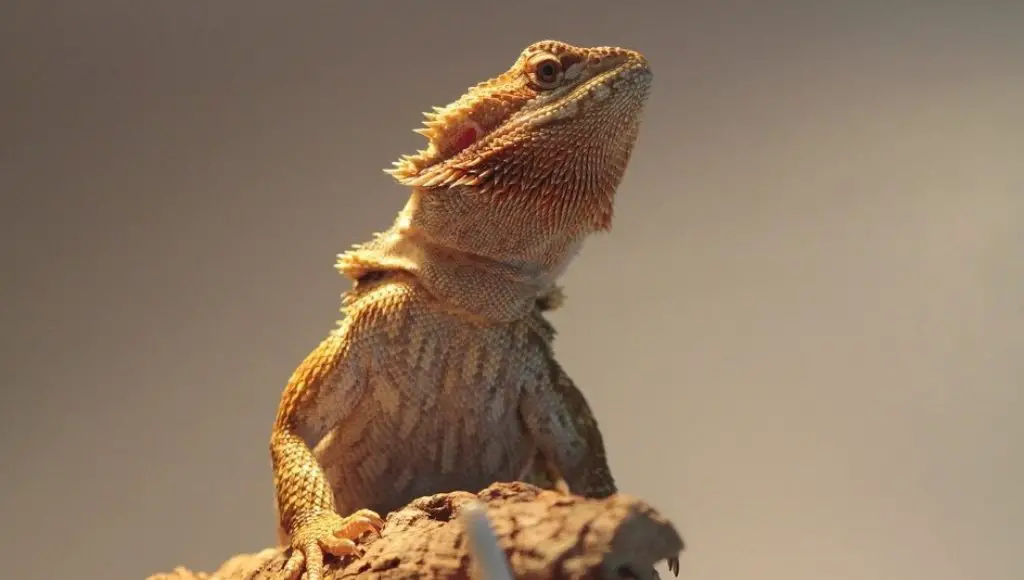11 Potential Reasons For Bearded Dragon Not Eating With Tips

If you’re worried about your bearded dragon’s sudden loss of appetite, you’re in the right place.
In this post, we’ll dive into the common reasons why your scaly friend might not be eating and share some practical tips to help get those taste buds back in action.
Let’s get that bearded dragon’s appetite roaring again!
Bearded Dragon Not Eating
Your bearded dragon may not be eating due to stress, illness, improper diet, environment factors, shedding, brumation, or being impacted.
If your bearded dragon is not eating, it’s important to first determine the reason and this can be done by checking for signs of illness, ensuring the enclosure conditions are optimal, and considering other factors such as shedding or brumation.
If the issue persists, it’s recommended to seek veterinary advice to address any potential health concerns.
Let’s break it down further…
Reasons For a Bearded Dragon Not Eating

Here are some common reasons for a bearded dragon not eating:
1. Excessive stress
Just like us humans, bearded dragons can get stressed out too.
If there have been recent changes in their environment, such as a new cage setup, loud noises, or even a new pet in the house, it might be causing them stress.
This can lead to a loss of appetite. Try to create a calm and comfortable environment for your dragon, and give them some time to adjust.
2. Incorrect temperature and humidity levels
Bearded dragons are very particular about their living conditions, and the temperature and humidity levels play a significant role in their appetite.
If the temperature is too high or too low, it can affect their metabolism, making them lose interest in food.
Similarly, improper humidity levels can cause discomfort. Make sure you have a reliable thermometer and hygrometer to monitor these levels accurately.
Adjust the heat and humidity as needed to create a comfortable environment for your dragon.
3. Incorrect lighting
Adequate lighting is essential for the overall health and well-being of your bearded dragon.
They require a proper balance of UVA and UVB light to synthesize vitamin D3, which helps them absorb calcium from their diet.
If they don’t get enough UVB light, it can lead to a condition called metabolic bone disease, which can impact their appetite.
Ensure you have the right type of UVB light and that it’s positioned correctly within their habitat.
4. Brumation
Bearded dragons are known to go through a natural process called brumation, which is similar to hibernation in other animals.
During brumation, they tend to become less active and eat less. It’s their way of conserving energy during colder months.
If your bearded dragon is of appropriate age and you’ve ruled out other factors, it’s possible they’re going through brumation.
During this time, it’s important to monitor their weight and make sure they’re staying hydrated. If you’re concerned, consult with a reptile veterinarian for guidance.
5. Impaction
One possible reason why a bearded dragon may not be eating is impaction.
Impaction occurs when your dragon has ingested something that is causing a blockage in their digestive system.
This can happen if they accidentally eat loose substrate or ingest a large piece of food that is difficult to digest.
If your bearded dragon is impacted, they may show signs such as decreased appetite, lethargy, and difficulty defecating.
It’s important to ensure that your dragon’s enclosure is set up with appropriate substrate and that you provide them with appropriately sized food items to minimize the risk of impaction.
6. Illness or parasites
Another reason for a bearded dragon’s lack of appetite could be an underlying illness or parasite infestation.
Various health issues, such as respiratory infections, metabolic bone disease, or organ dysfunction, can impact their appetite.
Additionally, parasites like worms or protozoa can disrupt their digestive system and cause discomfort, leading to a loss of appetite.
If you notice other symptoms like weight loss, lethargy, or abnormal bowel movements, it’s essential to seek veterinary attention to diagnose and treat any potential health issues.
7. Digestive issues
Bearded dragons can experience digestive issues that affect their appetite.
For instance, they may have a sensitive stomach that reacts negatively to certain foods, resulting in a temporary loss of appetite.
Inadequate temperature gradients in their enclosure can also impact their digestion and appetite.
It’s crucial to maintain the proper temperature and humidity levels in their habitat and provide a varied diet that includes appropriate vegetables, fruits, and insects to ensure their digestive system functions optimally.
8. Hunger strike
Sometimes, bearded dragons may go on a hunger strike for reasons that aren’t directly related to their health.
Environmental changes, such as a new enclosure, relocation, or changes in their routine, can cause stress and lead to a temporary loss of appetite.
Additionally, during brumation, a period of reduced activity similar to hibernation, bearded dragons may naturally decrease their food intake.
However, if your dragon is not eating for an extended period or is losing significant weight, it’s crucial to monitor their health closely and seek professional advice if necessary.
9. Food Preferences
Bearded dragons have their own unique food preferences, and sometimes they can be picky eaters.
They may refuse to eat certain types of food or show a preference for specific insects, vegetables, or fruits.
If your bearded dragon is not eating, it’s worth considering whether there have been any recent changes in their diet.
You can try offering a variety of food options to see if there’s something that piques their interest.
Experimenting with different food items and textures can often help stimulate their appetite.
10. Environmental Changes
Bearded dragons are highly sensitive to changes in their environment.
If there have been recent changes in their enclosure, such as temperature, lighting, or the arrangement of furniture, it can cause stress and affect their appetite.
Ensure that the temperatures and humidity levels in their enclosure are within the appropriate range for their species.
Providing a comfortable and secure environment, with appropriate hiding spots and basking areas, can help reduce stress and encourage eating.
Also, make sure their enclosure is clean and free from any potential sources of discomfort or illness.
11. Mating Season
During mating season, which typically occurs during the spring, male bearded dragons may experience a decrease in appetite.
This is because they become more focused on finding a mate and engaging in courtship behaviors.
If your bearded dragon is a male and it’s mating season, a temporary decrease in appetite may not be a cause for concern.
However, if the loss of appetite persists for an extended period or is accompanied by other symptoms, it’s essential to consult a veterinarian to rule out any underlying health issues.
Remember, if your bearded dragon continues to refuse food for an extended period, shows other signs of illness, or experiences weight loss, it’s crucial to seek professional veterinary advice.
What to do if your bearded dragon is not eating

If your bearded dragon is not eating, there are a few things you can do. First, check the temperature and lighting in their enclosure to make sure it’s suitable for digestion.
Next, offer a variety of fresh vegetables and insects to entice their appetite. You can also try hand-feeding them to stimulate their interest.
If the problem persists, consult a reptile veterinarian to rule out any underlying health issues.
Remember to monitor their weight and hydration levels during this time.
Learn more about bearded dragon like and dislikes.
Encouraging bearded dragon to eat

Here are some effective ways to entice your bearded dragon to dig into their meals:
1. Serve up a variety of delicious food: Bearded dragons love a diverse diet, so make sure you’re offering them a range of tasty options. Mix it up with different insects like crickets, mealworms, or even some leafy greens and fruits.
2. Experiment with different textures: Sometimes, the texture of the food can make all the difference. Try offering your bearded dragon both live and freeze-dried insects to see which they prefer. You can also try cutting up fruits and veggies into different shapes and sizes to make it more interesting for them.
3. Offer food at the right temperature: Bearded dragons are more likely to eat when their food is warmed up to the right temperature. Use a reptile-specific heating pad or a basking spot lamp to warm up their meals to around 100-110°F (38-43°C).
4. Enhance the aroma: Just like us, bearded dragons are attracted to delicious smells. You can try lightly dusting their food with calcium powder or a reptile vitamin supplement, which will not only add some extra nutrients but also make the food more enticing.
5. Make mealtime interactive: Bearded dragons are natural hunters, so stimulating their hunting instincts can encourage them to eat. You can try moving the food around in their enclosure or using feeding tongs to make it more interactive.
6. Create a feeding schedule: Establishing a regular feeding schedule can help your bearded dragon develop a routine and make them more likely to eat. Aim to feed them at the same time every day, making sure they have plenty of time to digest their food before bedtime.
7. Ensure a comfortable environment: Bearded dragons are sensitive to their surroundings. Make sure their enclosure is clean, well-maintained, and at the right temperature and humidity levels. A comfortable environment can make them feel more relaxed and more likely to eat.
8. Offer food in a separate feeding area: Some bearded dragons can be territorial, so offering their food in a separate spot away from their basking area can help them focus on eating without distractions.
9. Patience and persistence: Keep in mind that bearded dragons can be finicky eaters at times, especially if they are going through a shedding or brumation period. Be patient and don’t get discouraged if they don’t eat right away. Keep trying different foods and techniques until you find what works best for them.
Remember, each bearded dragon is unique, so it may take some time to figure out their preferences. Just keep experimenting, and soon enough, your little buddy will be happily munching away!
FAQs
Why is my bearded dragon not eating?
Bearded dragons can go through periods of reduced appetite due to various reasons. Some common causes include stress, illness, temperature fluctuations, or simply being picky eaters. It’s important to monitor their behavior and consult a veterinarian if the lack of appetite persists.
How long can a bearded dragon go without eating?
Bearded dragons can generally go without eating for several weeks, especially during brumation (a period of hibernation-like behavior). However, if your dragon is consistently refusing food for more than a week or shows signs of weight loss or illness, it’s crucial to seek veterinary advice.
What can I do to encourage my bearded dragon to eat?
There are a few methods you can try to stimulate your bearded dragon’s appetite. Firstly, ensure that the temperature and lighting in their enclosure are appropriate as these factors greatly influence their appetite. You can also try offering a variety of food options, such as live insects, leafy greens, and even fruits. Additionally, hand-feeding or lightly misting their food with water may entice them to eat.
Should I be worried if my bearded dragon refuses to eat vegetables?
While vegetables are an important part of a bearded dragon’s diet, some individuals may be more reluctant to consume them. If your dragon refuses to eat vegetables, try offering a wider variety of options and experiment with different preparation methods, such as finely chopping or pureeing the vegetables. If they continue to refuse, consult a reptile veterinarian to ensure your pet’s nutritional needs are being met.
Is it normal for bearded dragons to lose their appetite during shedding?
Yes, it is common for bearded dragons to have a reduced appetite during shedding. Shedding can be uncomfortable for them, and they may not feel like eating during this time. Ensure that their enclosure has proper humidity levels to aid in the shedding process, and offer softer foods or smaller insects that are easier for them to consume.
When should I be concerned about my bearded dragon not eating?
If your bearded dragon consistently refuses food for more than a week, loses weight, appears lethargic, or shows other signs of illness, it’s best to seek veterinary attention. A reptile veterinarian will be able to assess your pet’s health, conduct necessary tests, and provide appropriate treatment if required. Remember, it’s always better to be cautious and address any concerns promptly to ensure the well-being of your bearded dragon.
Conclusion
Remember, when your bearded dragon refuses to eat, it can be concerning. But don’t worry, you’re not alone in this journey. By providing a comfortable environment, offering a variety of nutritious foods, and seeking veterinary advice when needed, you’ll be on the right track to getting your scaly friend back to their healthy and happy self in no time.
